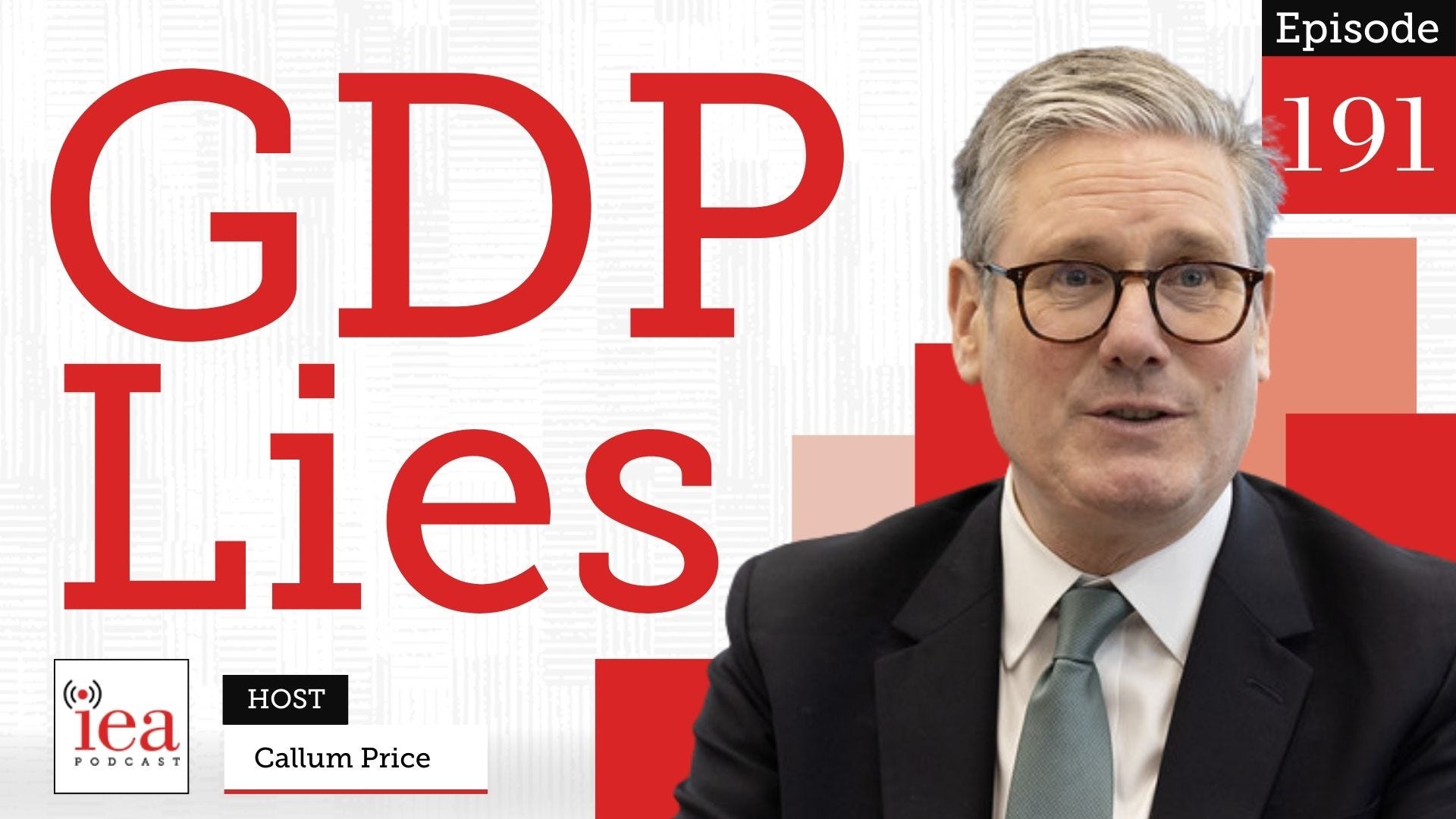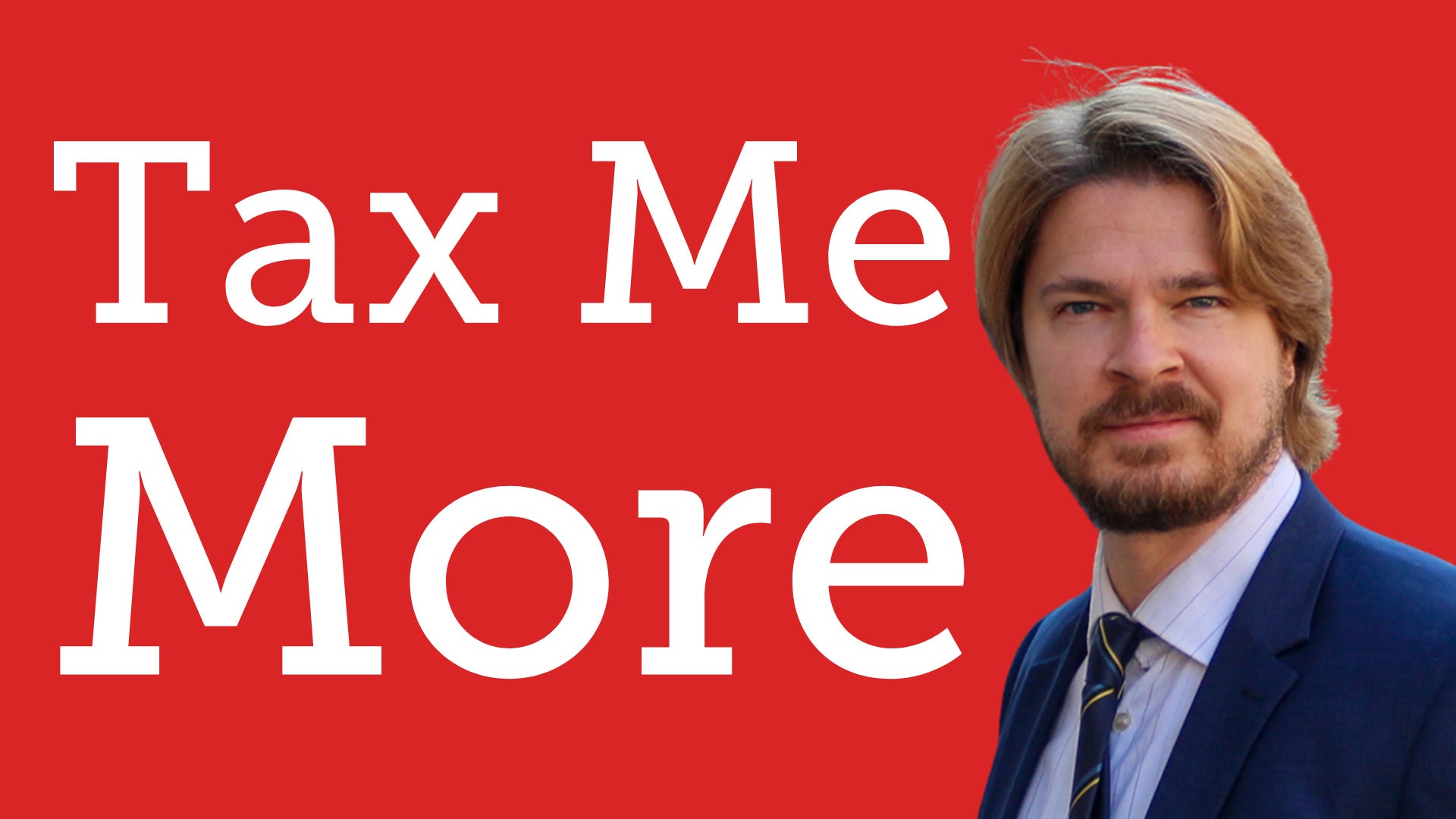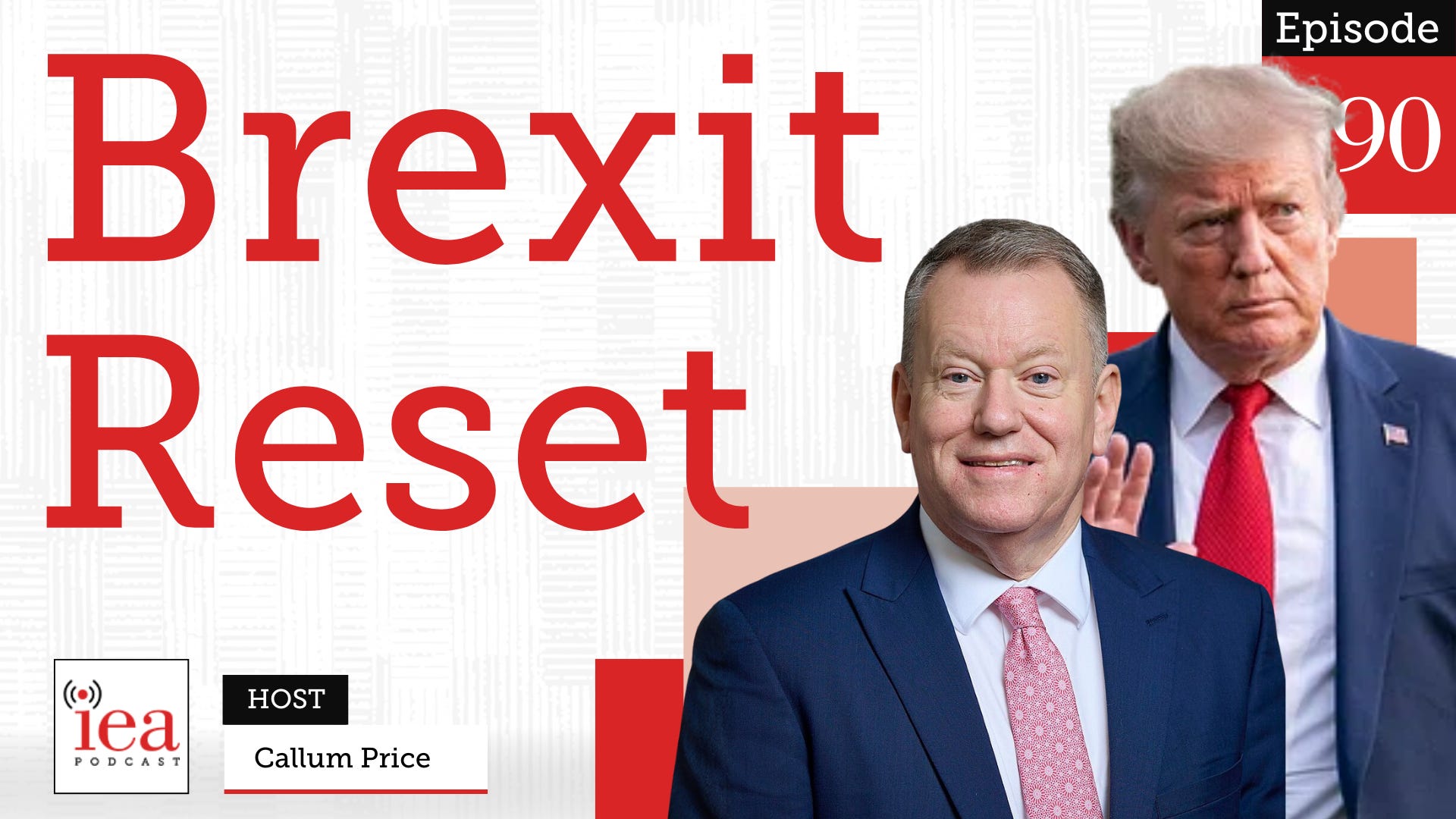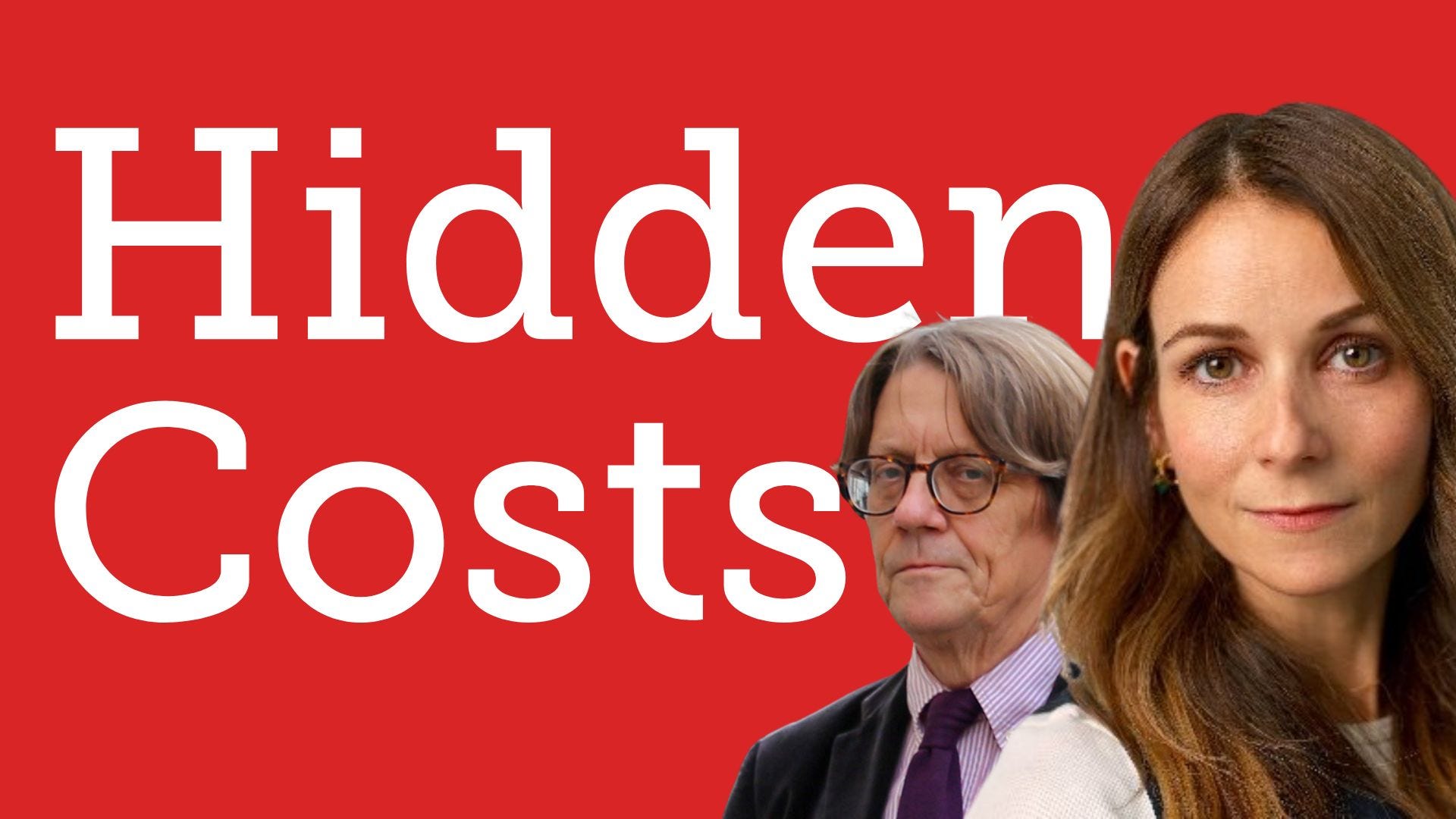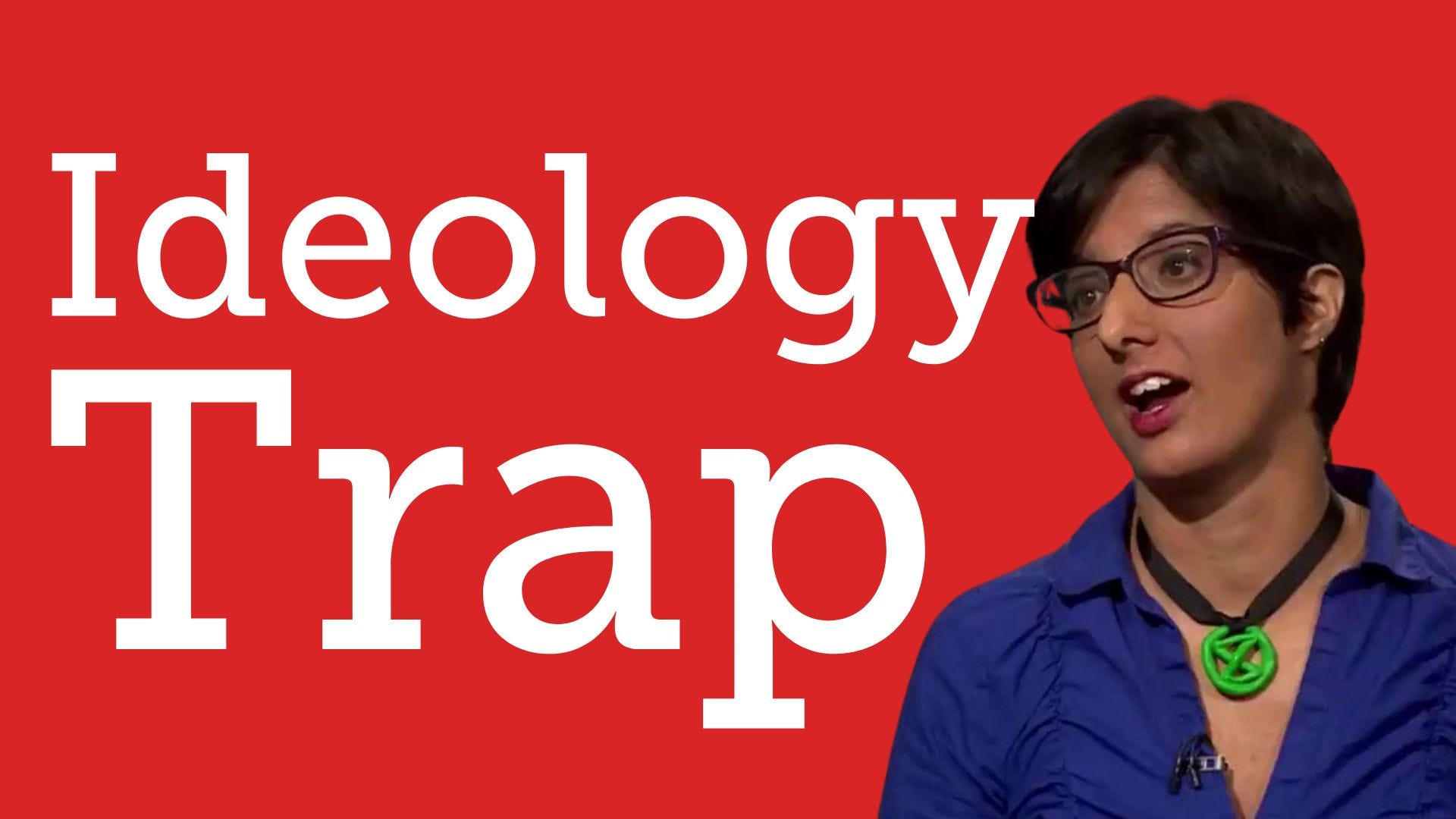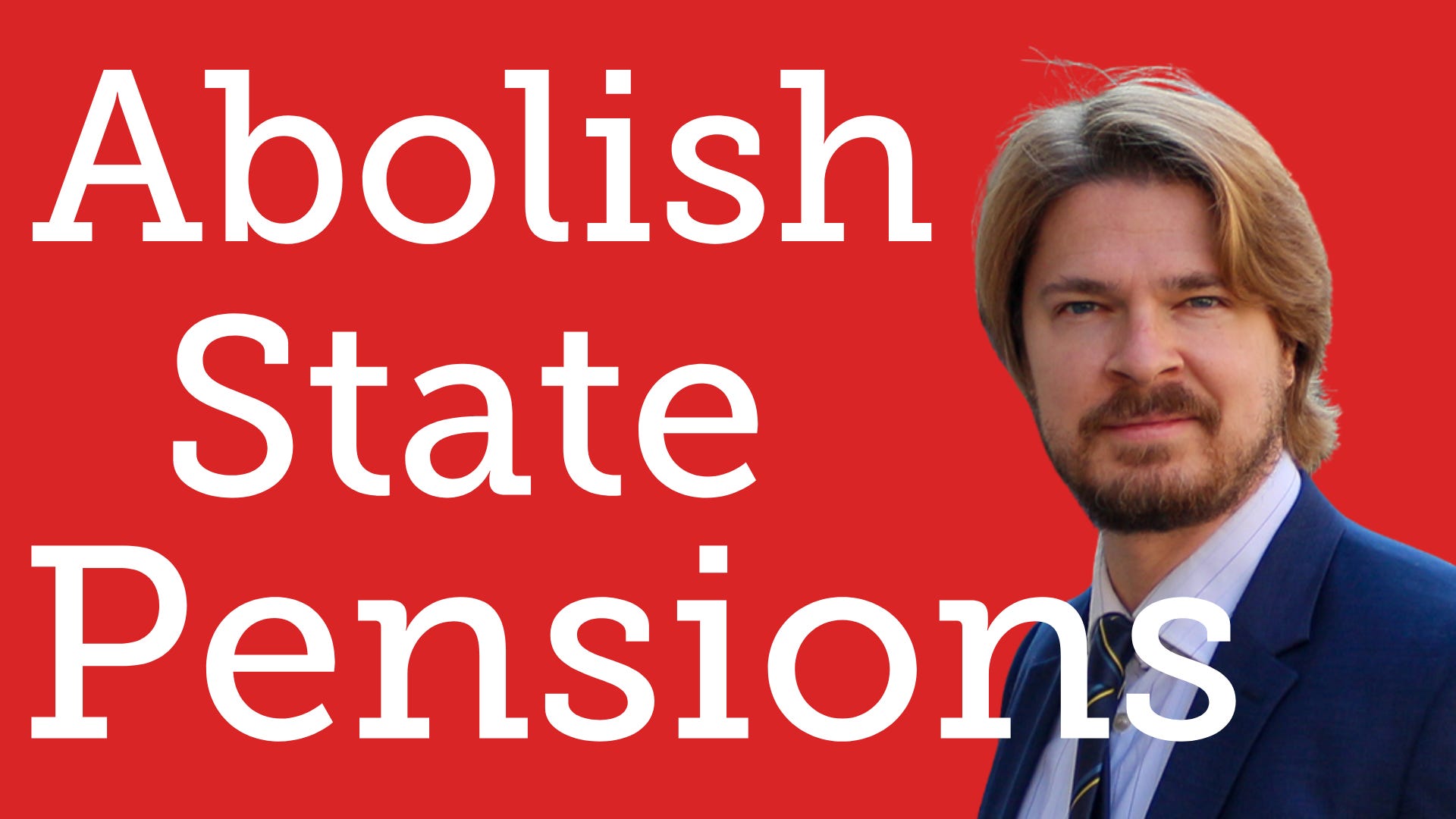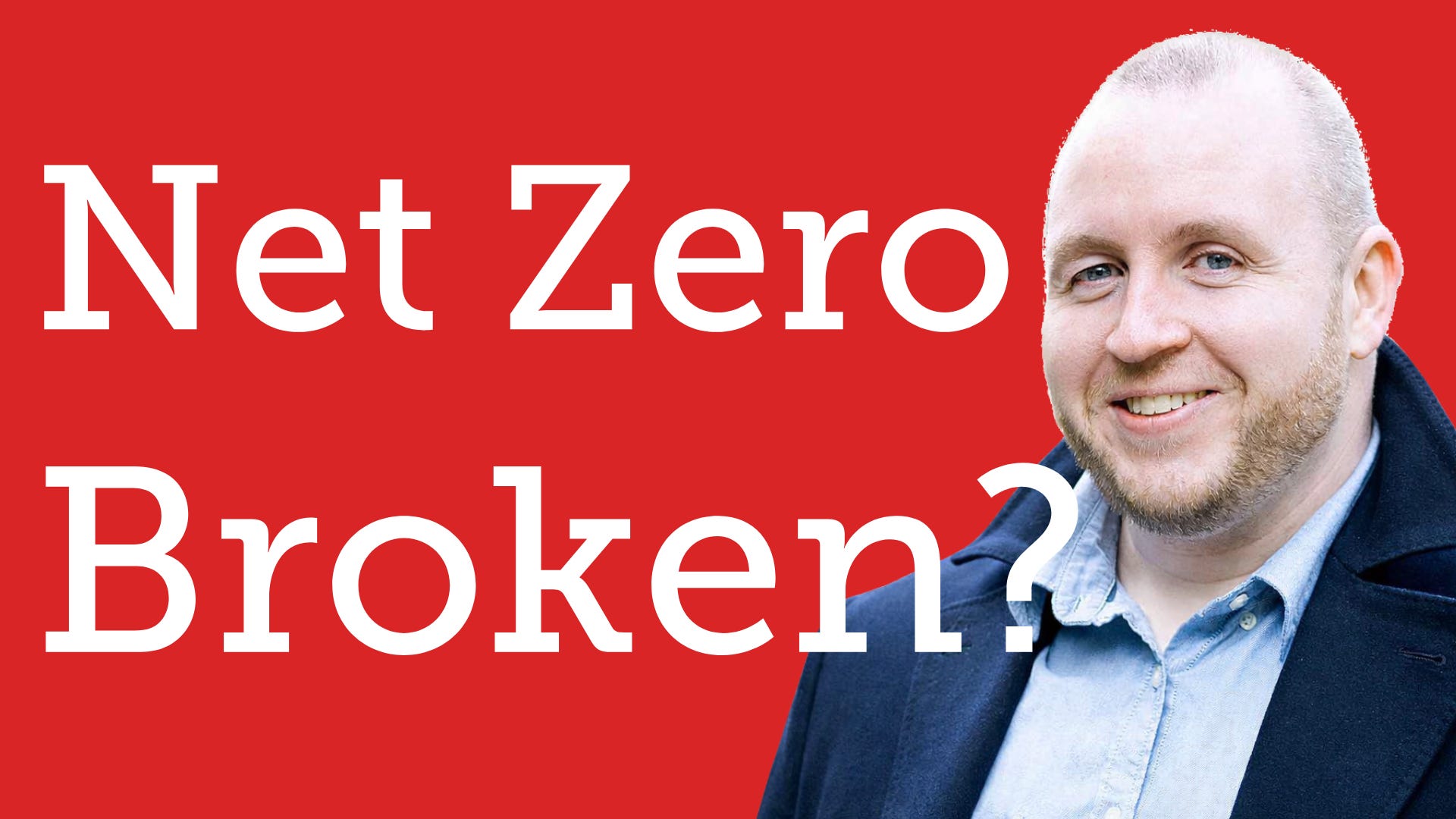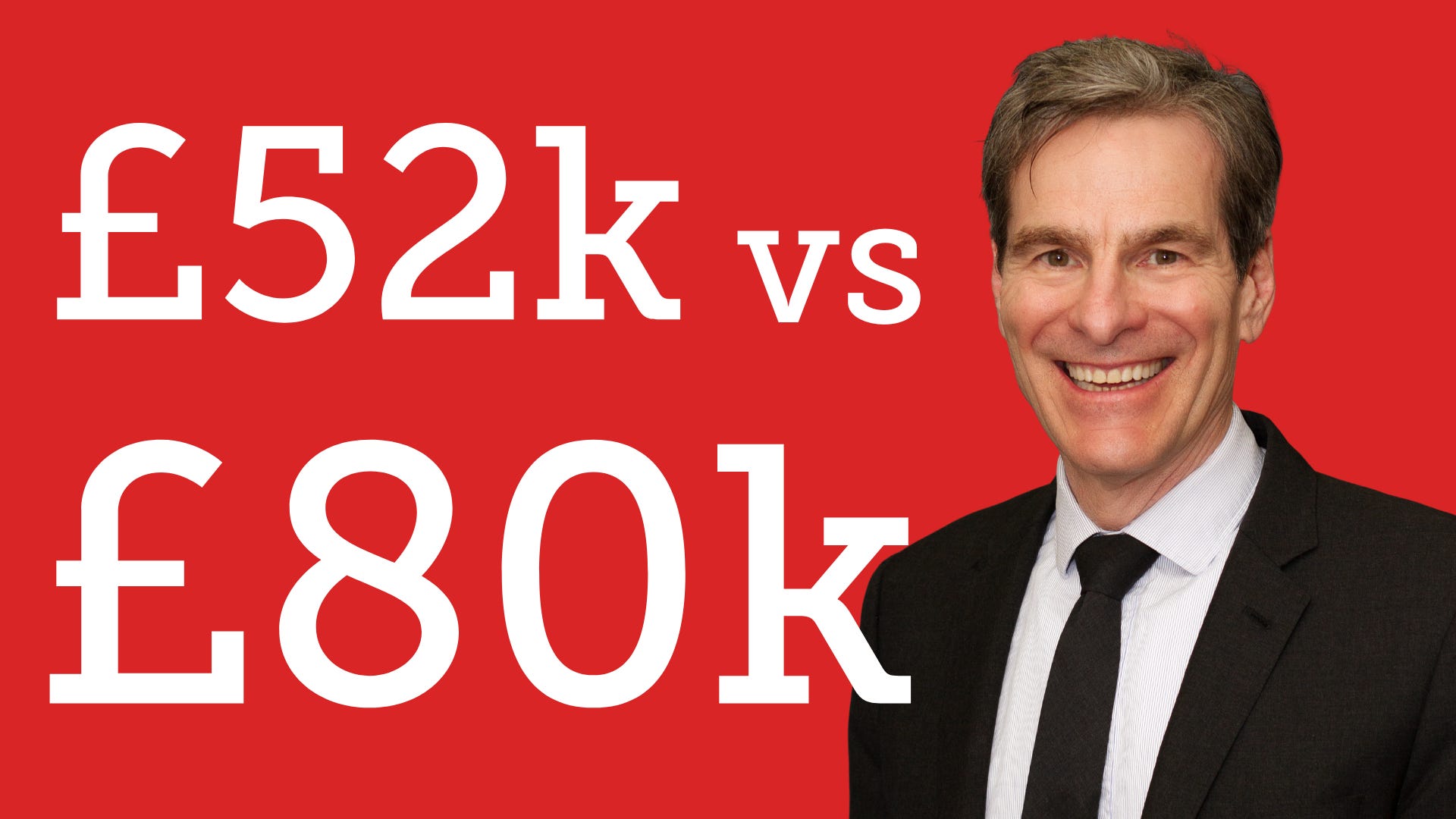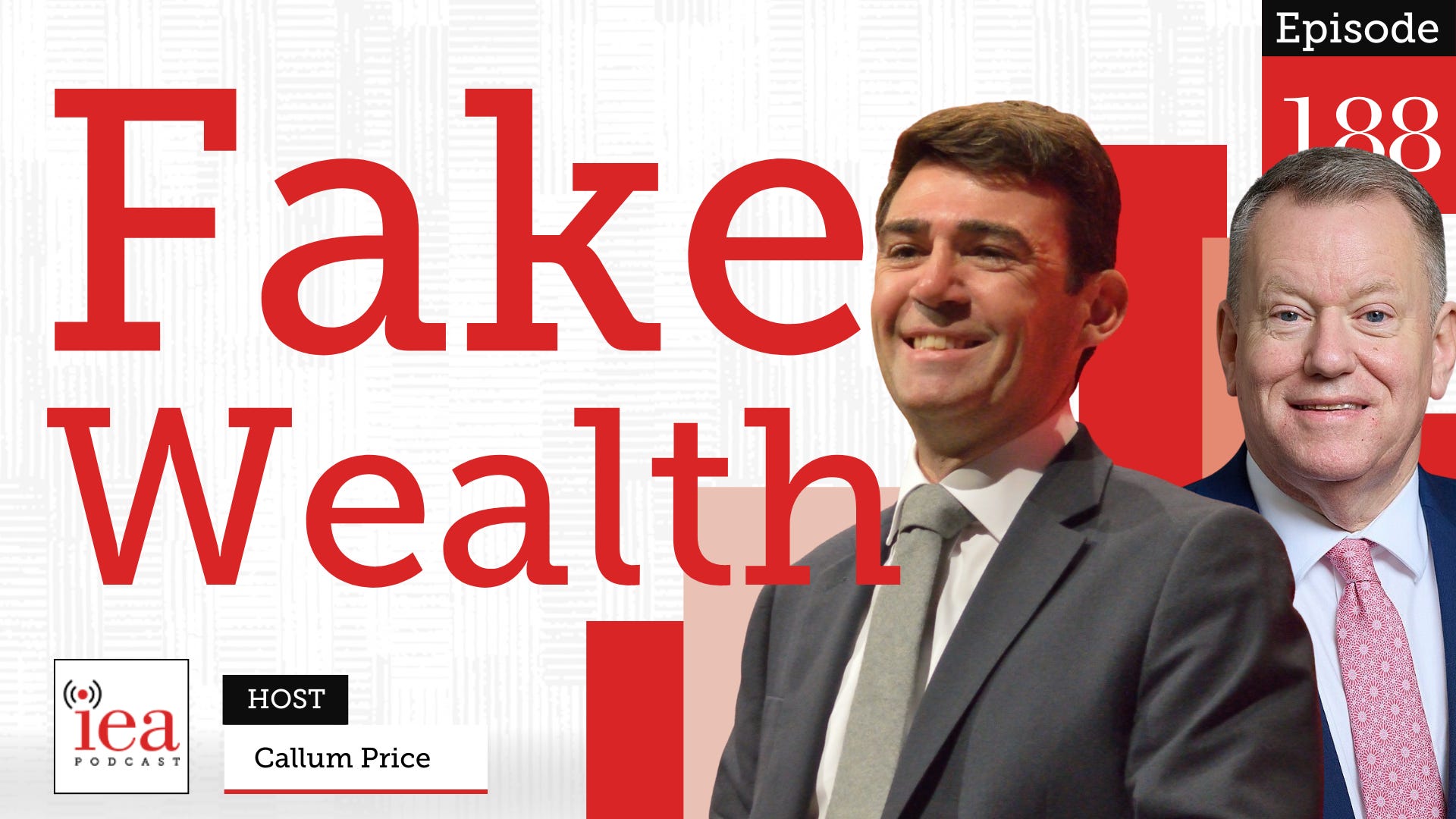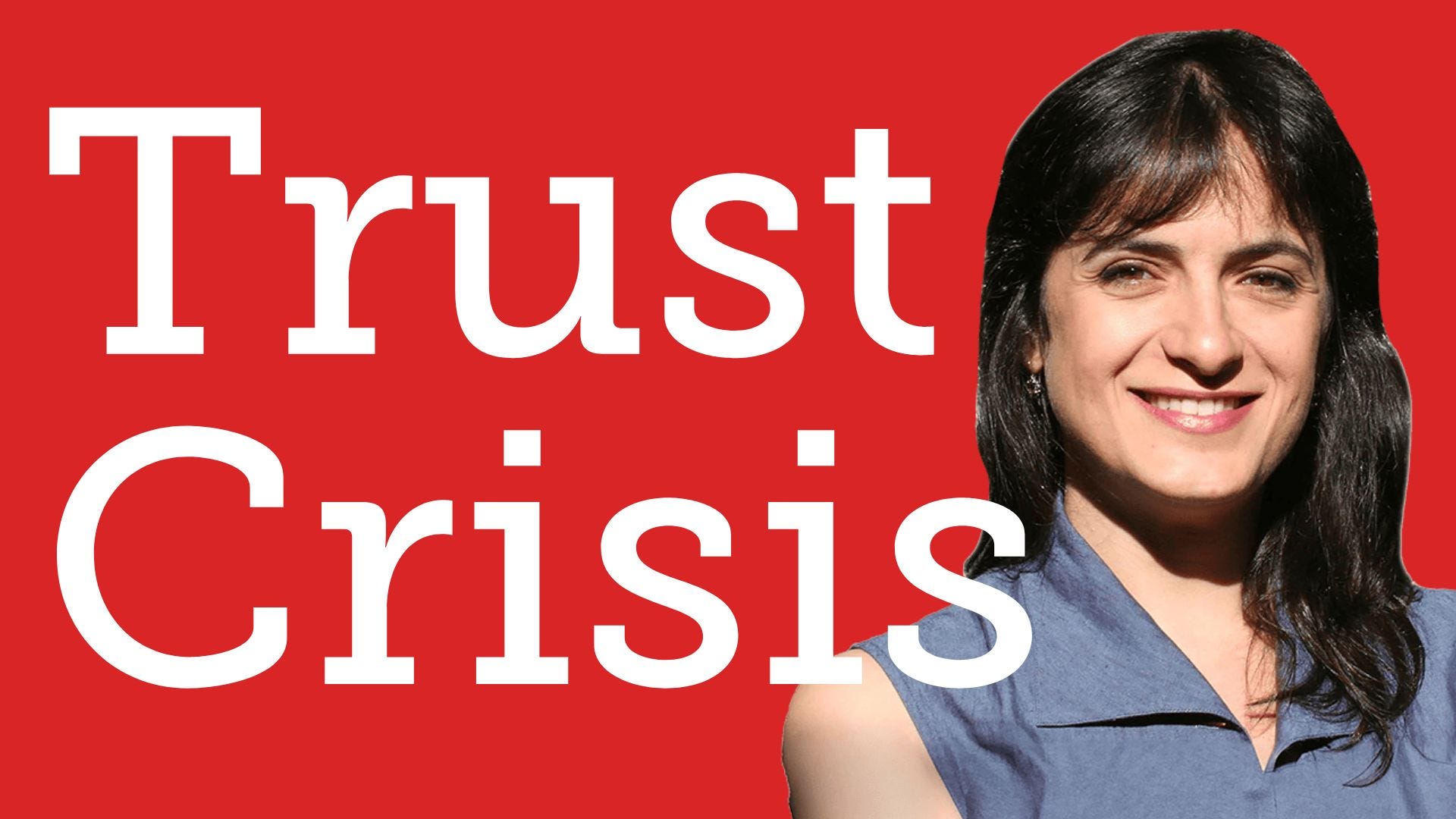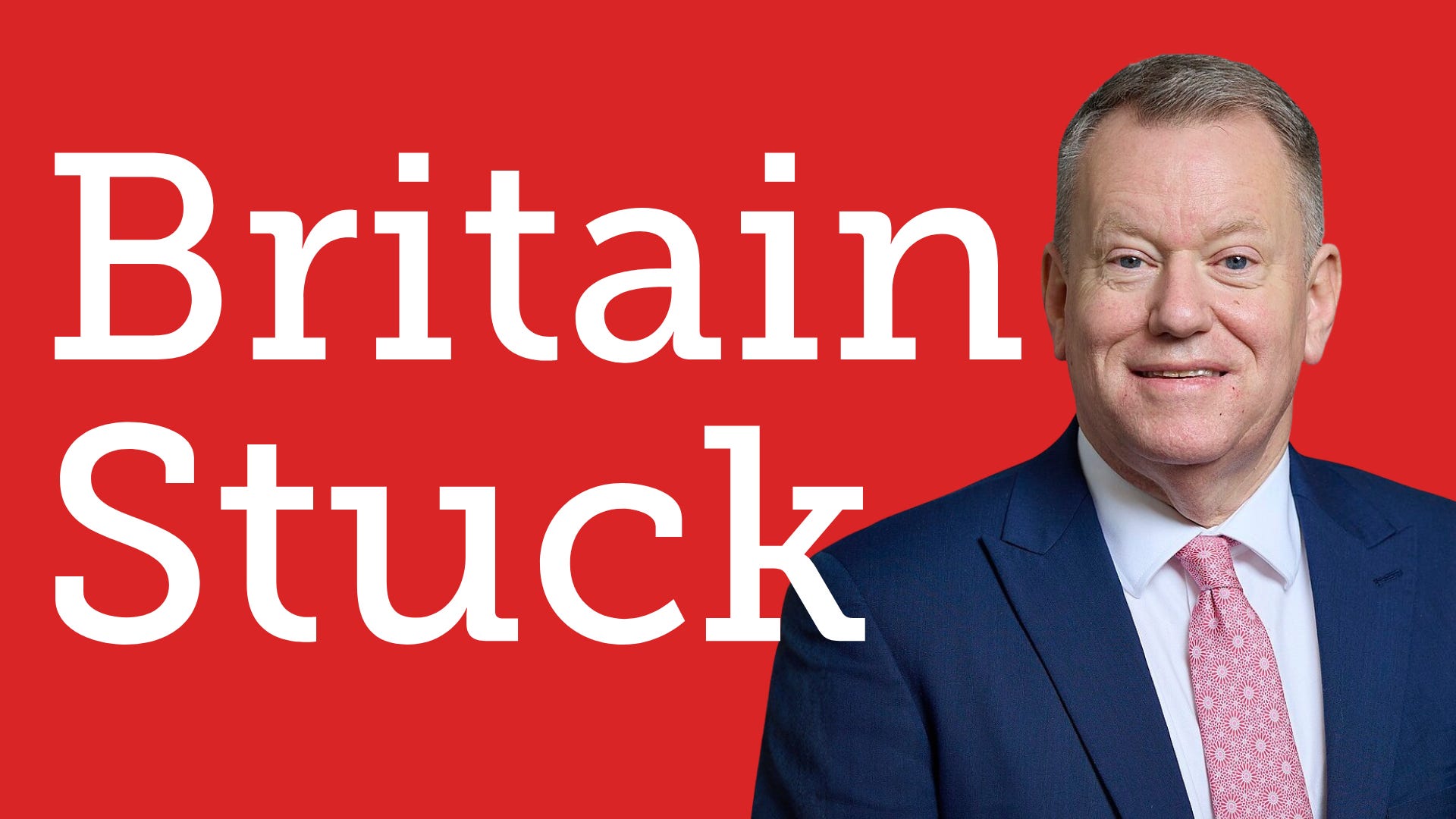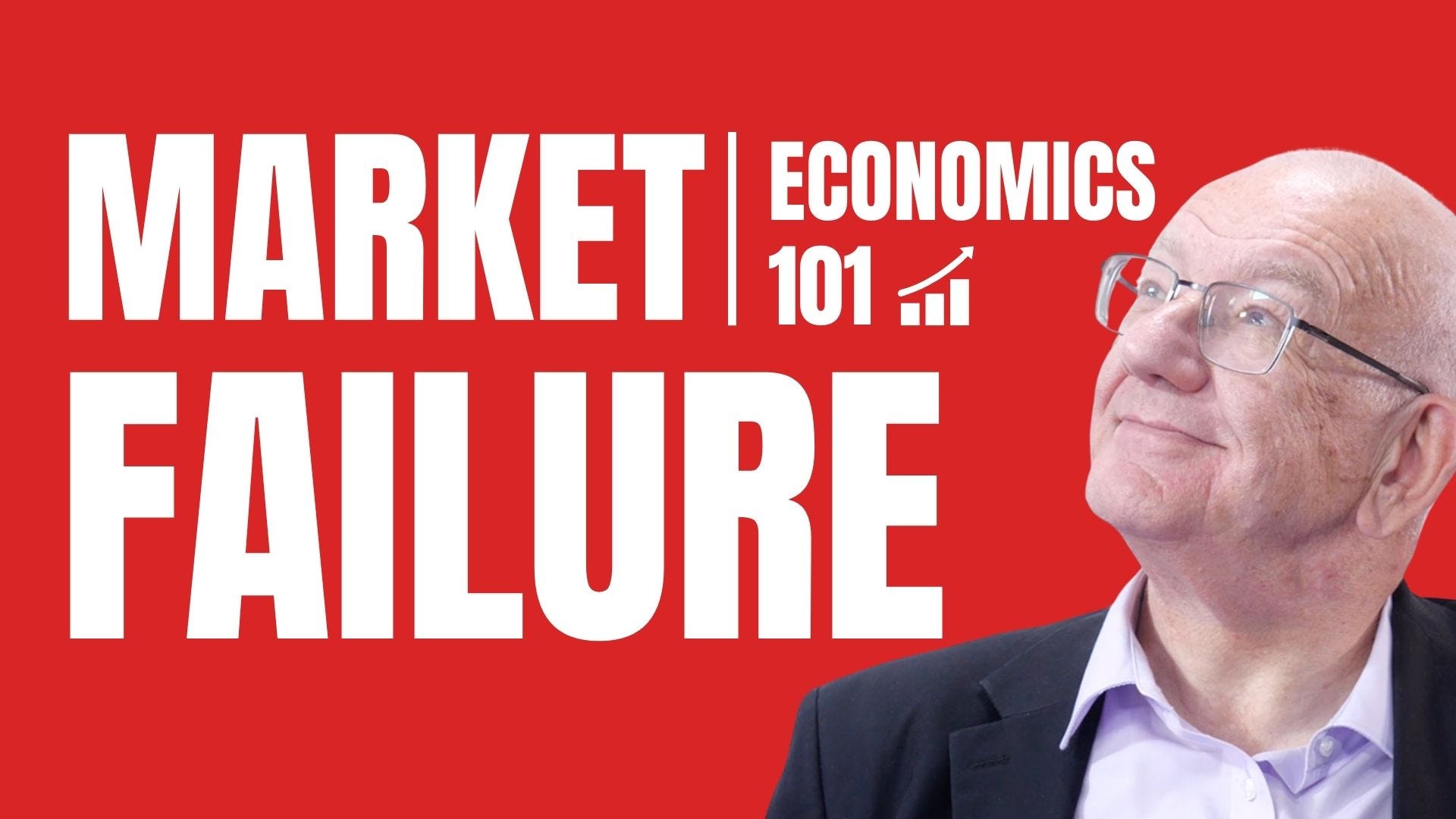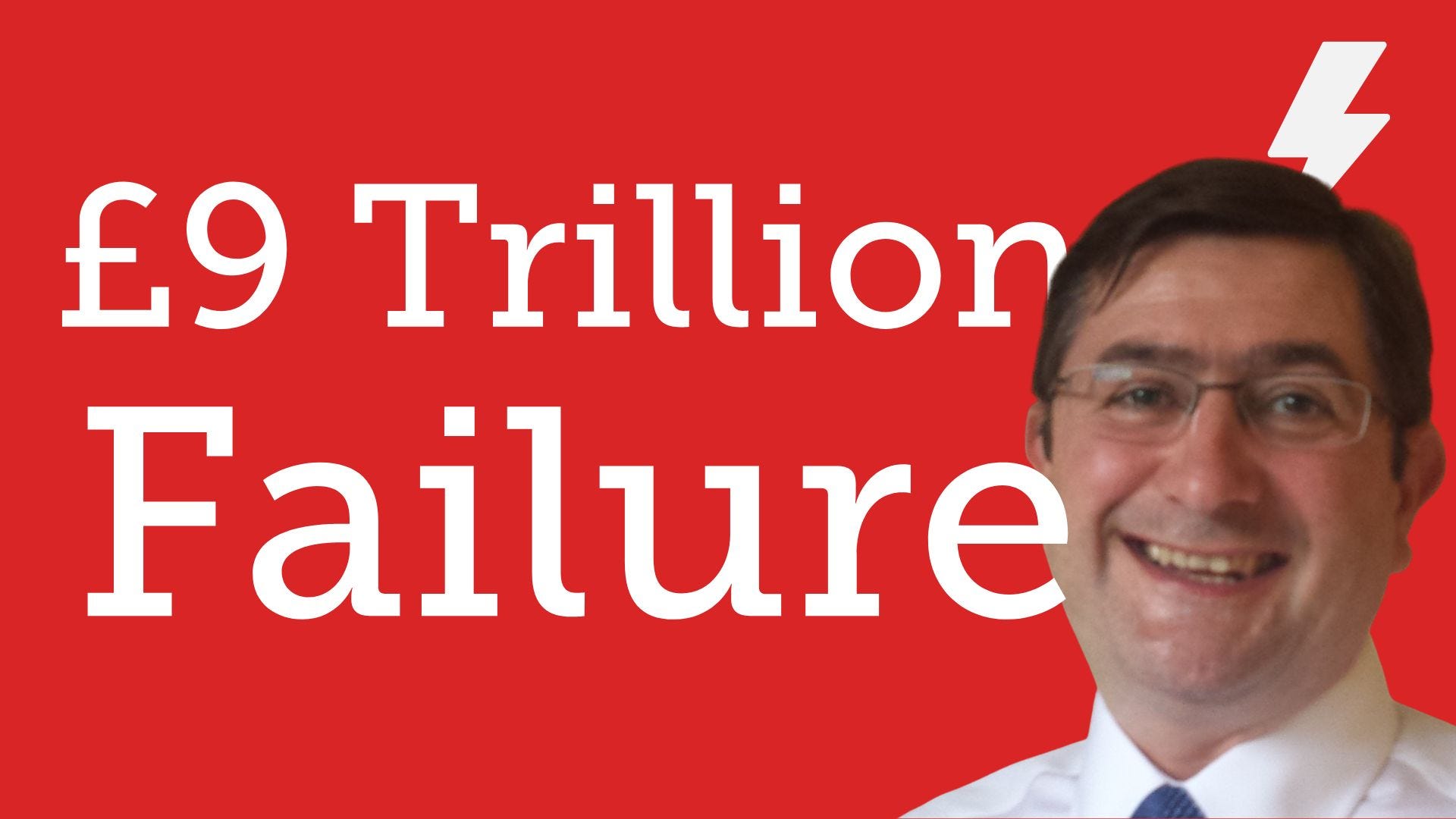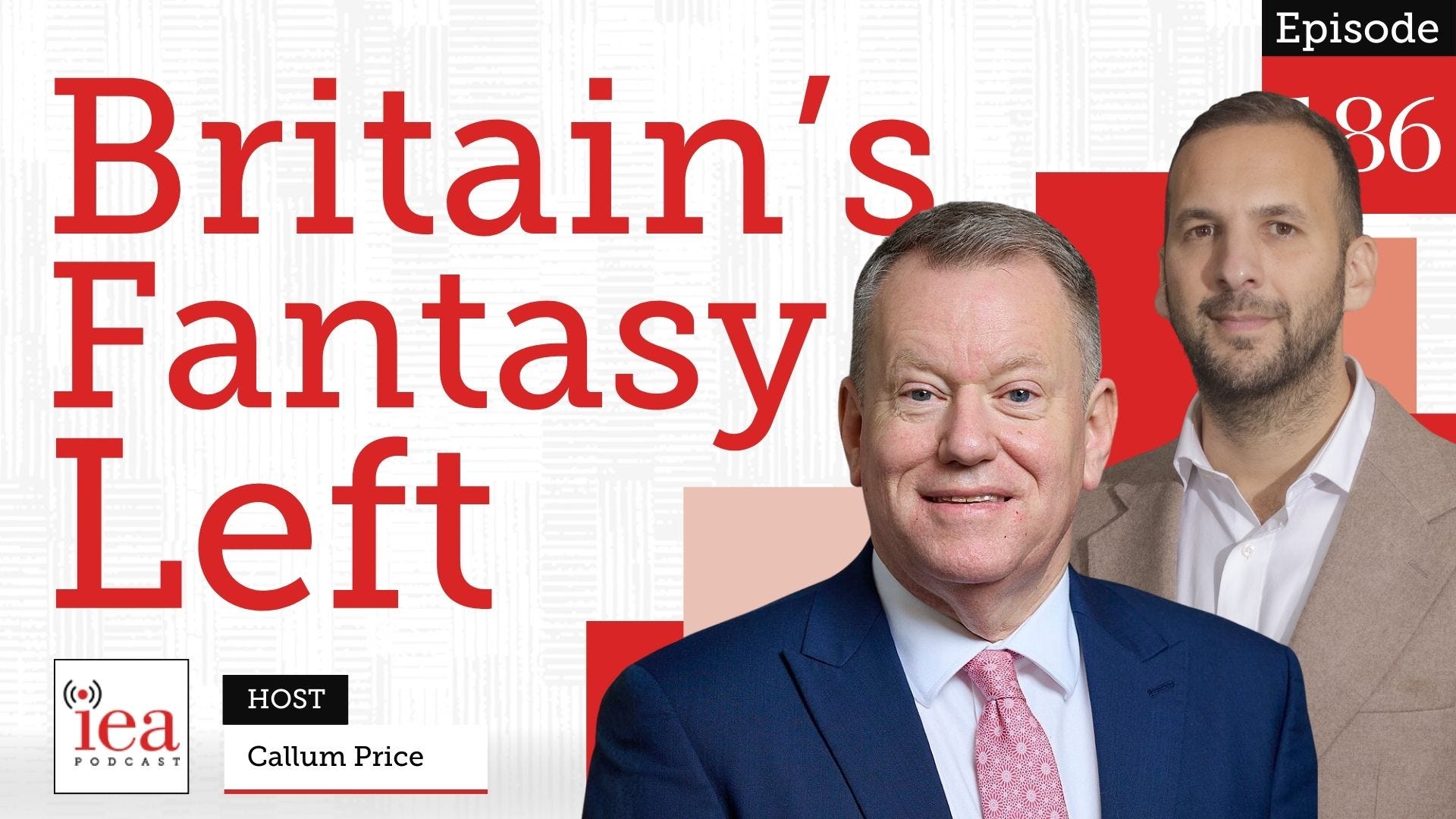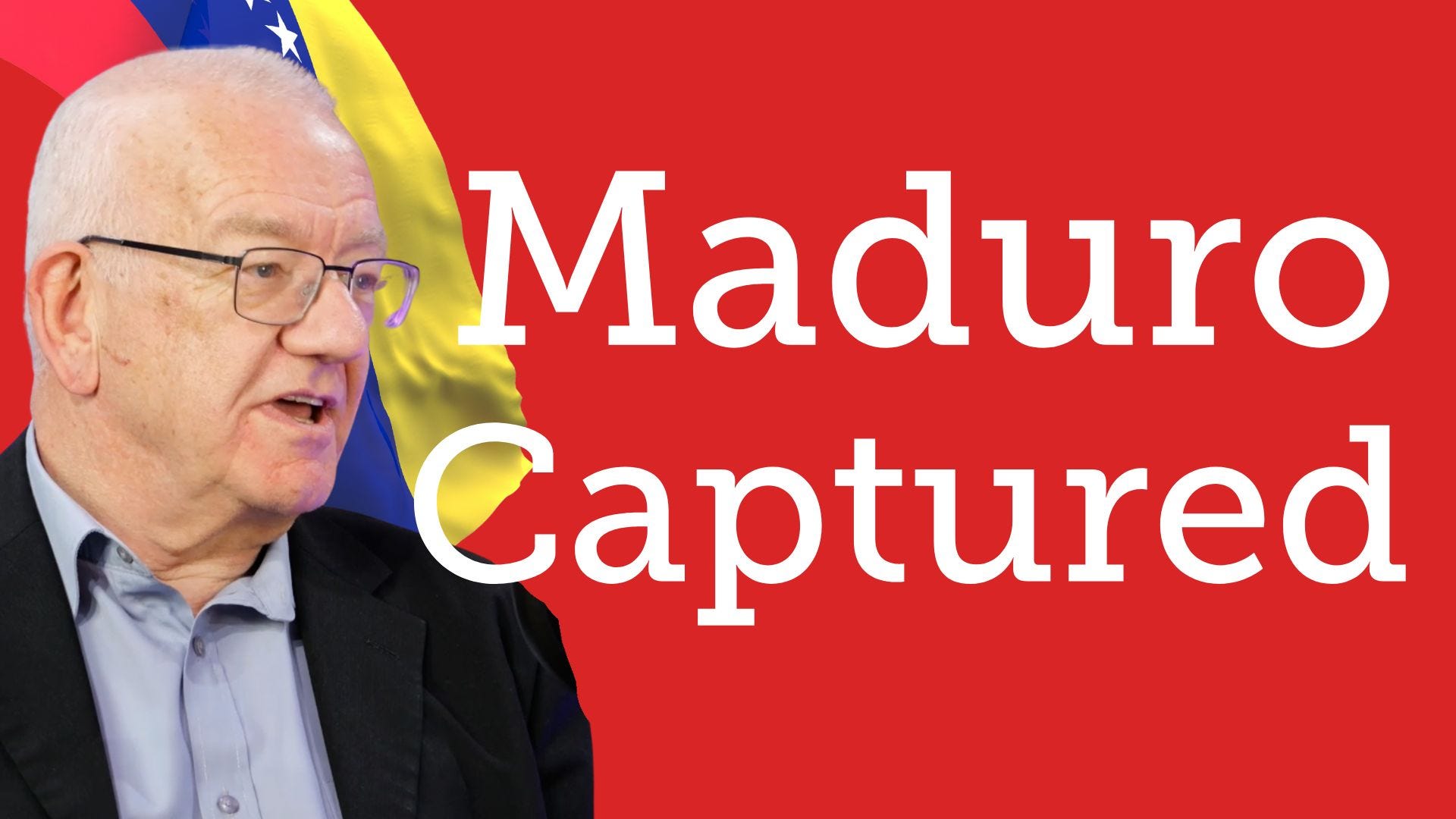Discover IEA Podcast
IEA Podcast

IEA Podcast
Author: Institute of Economic Affairs
Subscribed: 441Played: 17,355Subscribe
Share
© Institute of Economic Affairs
Description
The Institute of Economic Affairs podcast examines some of the pressing issues of our time. Featuring some of the top minds in Westminster and beyond, the IEA podcast brings you weekly commentary, analysis, and debates.
insider.iea.org.uk
insider.iea.org.uk
320 Episodes
Reverse
In this Institute of Economic Affairs podcast, host Callum Price speaks with Lord Frost, Director General, and Kristian Niemietz, Editorial Director. The conversation examines the latest GDP figures showing 0.1% growth in the final quarter of 2024, with GDP per capita falling for the second consecutive quarter. They discuss why Keir Starmer's celebration of these figures misses the point that people are not actually getting richer, and how Labour's Employment Rights Act and tax rises have contributed to economic stagnation.The discussion turns to whether any political party has a credible growth strategy, criticising the Liberal Democrats' proposal to split the Treasury and relocate part of it to Birmingham as "cargo cult economics". They examine Andy Burnham's economic thinking, including his views on electoral reform and nationalisation, questioning whether his prescriptions would actually lead to the stability and growth he promises. The conversation also covers why proportional representation might create less political stability rather than more, and the persistent problem of "rich country syndrome" where Britain maintains the political discourse of a prosperous nation despite 15 years of stagnation.The podcast concludes with debates on water nationalisation, examining why the sector lacks genuine competition and whether state ownership would solve fundamental problems of investment and infrastructure. They discuss the parallels with the NHS's short-term investment failures, the planning system's role in preventing reservoir construction despite Britain being one of the wettest countries in the world, and a bizarre Supreme Court ruling banning the use of the word "milk" for plant-based products.The Institute of Economic Affairs is a registered educational charity. It does not endorse or give support for any political party in the UK or elsewhere. Our mission is to improve understanding of the fundamental institutions of a free society by analysing and expounding the role of markets in solving economic and social problems.The views represented here are those of the speakers alone, not those of the Institute, its Managing Trustees, Academic Advisory Council members or senior staff. This is a public episode. If you'd like to discuss this with other subscribers or get access to bonus episodes, visit insider.iea.org.uk/subscribe
The IEA’s Kristian Niemietz joins Callum Price to dissect the Patriotic Millionaires campaign and their push for wealth taxes. Survey evidence shows millionaires support higher taxes on themselves, but is this genuine commitment or virtue signalling? Niemietz examines the gap between stated preferences and revealed preferences, exploring why talk is cheap when there’s no real cost to supporting a tax that may never happen.The conversation challenges the claim that millionaire support for wealth taxes proves they won’t have negative behavioural effects. Even if wealthy individuals approve of taxation in principle, Niemietz argues they still respond to tax incentives in practice, just as shoppers react to VAT without making philosophical statements. He dismantles Gary Stevenson’s appeal to authority and explains why making money from binary bets doesn’t validate broader economic theories.Whether progressive taxation advocate or free market sceptic, this episode offers a critical examination of wealth tax campaigns and the disconnect between what people say they support and how they actually behave when faced with real economic incentives.The Institute of Economic Affairs is a registered educational charity. It does not endorse or give support for any political party in the UK or elsewhere. Our mission is to improve understanding of the fundamental institutions of a free society by analysing and expounding the role of markets in solving economic and social problems.The views represented here are those of the speakers alone, not those of the Institute, its Managing Trustees, Academic Advisory Council members or senior staff. This is a public episode. If you'd like to discuss this with other subscribers or get access to bonus episodes, visit insider.iea.org.uk/subscribe
The Bank of England has held interest rates at 3.75%, but Lord Frost and Kristian Niemietz warn that the “psychology of inflation” remains unbroken in the UK economy. With wages rising by government fiat and consumers still expecting persistent price increases, they argue that rushing back to near-zero rates would be a mistake. The Bank has simultaneously downgraded GDP growth forecasts to just 0.9% for this year, down from 1.4% last year, revealing an economy trapped in stagnation. Frost argues that a decade of near-zero interest rates has fundamentally distorted Britain’s economic structure, keeping unprofitable companies alive and preventing investment from flowing to its most productive uses.On Brexit, the conversation turns to Labour’s proposed “reset” with the EU and whether Britain has genuinely diverged enough to make realignment difficult. Frost reveals that the final thing he did in Number 10 on Brexit night was argue about game bird regulations, symbolising how deeply EU rules constrained British sovereignty even in the smallest areas. Both guests contend that Britain has done just enough post-Brexit reform to compensate for the estimated 1% cost of leaving the single market, which is why growth patterns haven’t dramatically changed. However, the failure to diverge more substantially leaves the door open for future governments to drift back towards EU alignment.The discussion highlights a fundamental tension in British economic policy. Without meaningful regulatory divergence, the single market remains an attractive option for those prioritising frictionless trade over sovereignty. Yet as Frost warns, rejoining would mean accepting rules with no influence over their creation, from pesticide regulations to gene editing restrictions. With inflation expectations still elevated and growth forecasts dire, Britain faces a choice between the painful structural reforms needed for genuine recovery or the comfortable drift back towards European regulatory convergence.The Institute of Economic Affairs is a registered educational charity. It does not endorse or give support for any political party in the UK or elsewhere. Our mission is to improve understanding of the fundamental institutions of a free society by analysing and expounding the role of markets in solving economic and social problems.The views represented here are those of the speakers alone, not those of the Institute, its Managing Trustees, Academic Advisory Council members or senior staff. This is a public episode. If you'd like to discuss this with other subscribers or get access to bonus episodes, visit insider.iea.org.uk/subscribe
In this Institute of Economic Affairs podcast, Callum Price, IEA Director of Communications, interviews Len Shackleton, IEA Editorial and Research Fellow, and Annabel Denham, columnist at The Telegraph and former IEA policy analyst. The conversation examines a new IEA paper on the government’s expanded flexible working mandates introduced in the Employment Rights Act, which now makes it extremely difficult for employers to refuse requests for flexible working arrangements.Len and Annabel discuss the hidden costs and unintended consequences of these mandates, including how they may actually harm the workers they are designed to protect. They explore how protected characteristics combined with flexible working requests can expose employers to unlimited discrimination claims, potentially leading businesses to avoid hiring workers with protected characteristics such as working mothers. The conversation also examines how flexible working creates pay disparities between those who can work remotely (effectively receiving a 5 to 7% pay increase) and essential workers in hospitals, transport and other sectors who cannot, particularly affecting public sector pay structures.The discussion concludes with analysis of the Employment Rights Act’s broader impact on economic growth and productivity, particularly in the public sector where productivity remains below pre-COVID levels. Len and Annabel argue that whilst flexible working can benefit both employees and employers in certain circumstances, the government should step back and allow employers and employees to negotiate these arrangements directly rather than imposing top-down mandates that create regulatory burdens, slow wage growth and ultimately discourage employment.The Institute of Economic Affairs is a registered educational charity. It does not endorse or give support for any political party in the UK or elsewhere. Our mission is to improve understanding of the fundamental institutions of a free society by analysing and expounding the role of markets in solving economic and social problems.The views represented here are those of the speakers alone, not those of the Institute, its Managing Trustees, Academic Advisory Council members or senior staff. This is a public episode. If you'd like to discuss this with other subscribers or get access to bonus episodes, visit insider.iea.org.uk/subscribe
Former Extinction Rebellion spokesperson Zion Lights joins Christopher Snowden to discuss her new book ‘Energy Is Life’ and her remarkable transformation from environmental activist promoting energy scarcity to advocate for nuclear power and technological abundance. Lights reveals the shocking hostility she faced from the Green Party simply for asking questions about nuclear energy, despite not even being pro-nuclear at the time. She explains how the environmental movement’s anti-technology stance and refusal to tolerate questioning ultimately drove her to break from her activist tribe and rethink everything she believed about energy and environmental solutions.The conversation explores why modern environmentalism often opposes the very technologies that could solve climate challenges whilst reducing consumption and emissions. Lights argues that groups like Extinction Rebellion are fundamentally driven by a romanticised view of poverty and a desire to return humanity to pre-industrial simplicity, rooted in what she calls ‘immense privilege and abundance’. She discusses the practical potential of small modular reactors versus large-scale nuclear plants, the importance of building nuclear facilities in communities that already understand and support the technology, and why transparency in nuclear development is essential for public acceptance.This wide-ranging discussion touches on fusion energy, desalination, artificial intelligence applications, and the psychological underpinnings of degrowth ideology. Lights makes a compelling case for why her new book represents a complete reversal of her 2015 publication promoting low-carbon lifestyles, and why questioning environmental orthodoxy remains so difficult within activist circles even today.The Institute of Economic Affairs is a registered educational charity. It does not endorse or give support for any political party in the UK or elsewhere. Our mission is to improve understanding of the fundamental institutions of a free society by analysing and expounding the role of markets in solving economic and social problems.The views represented here are those of the speakers alone, not those of the Institute, its Managing Trustees, Academic Advisory Council members or senior staff. This is a public episode. If you'd like to discuss this with other subscribers or get access to bonus episodes, visit insider.iea.org.uk/subscribe
In this special briefing episode, IEA Editorial Director Kristian Niemietz joins host Callum Price to discuss the latest instalment of the British Afuera series on Substack. Inspired by Javier Milei’s radical state reform in Argentina, the project examines which parts of the British state could be abolished entirely rather than simply cut back. Niemietz explains why this approach differs fundamentally from the Cameron-Osborne austerity years, which merely reduced spending across existing services rather than questioning whether the state should provide them at all.Niemietz makes a bold case for abolishing the universal state pension system and replacing it with an Australian-style model based on private savings. He argues that roughly 80% of the British population are perfectly capable of saving for their own retirement, and that the current system, which costs 7.5% of GDP, is economically unjustifiable for the vast majority. Drawing on international comparisons, Niemietz shows how countries like Australia manage to spend just 4.5% of GDP on old age benefits whilst maintaining adequate safety nets for those genuinely unable to save, demonstrating that a savings-based system can deliver better outcomes without leaving the vulnerable behind.The discussion covers the practical challenges of transitioning to such a system, including how to convert National Insurance into private pension savings, the risks of government interference in pension fund investment decisions, and how to design means-tested safety nets that don’t destroy savings incentives. Niemietz addresses common objections and explains why a capitalised pension system, where savings are invested in productive assets, delivers superior returns compared to the current pay-as-you-go model that depends on an ever-shrinking ratio of workers to retirees.The Institute of Economic Affairs is a registered educational charity. It does not endorse or give support for any political party in the UK or elsewhere. Our mission is to improve understanding of the fundamental institutions of a free society by analysing and expounding the role of markets in solving economic and social problems.The views represented here are those of the speakers alone, not those of the Institute, its Managing Trustees, Academic Advisory Council members or senior staff. This is a public episode. If you'd like to discuss this with other subscribers or get access to bonus episodes, visit insider.iea.org.uk/subscribe
In her final IEA podcast before moving to Washington DC, Reem Ibrahim is joined by Director General Lord Frost and Editorial Director Kristian Niemietz to examine two pressing economic questions: should we be optimistic about Britain’s economic future, and do we need a universal basic income because of artificial intelligence?The conversation begins with a critical analysis of recent claims that Britain stands on the verge of economic recovery, driven by stored-up capital and AI productivity gains. Lord Frost and Niemietz push back against this optimism, arguing that Britain’s structural problems, particularly around energy policy and net zero constraints, make such a recovery unlikely. They contrast Britain’s anaemic 0.1% growth with America’s 3.5%, pointing to affordable energy as a crucial differentiator that UK policy actively undermines.The discussion then turns to universal basic income, prompted by fears that AI will destroy jobs. Whilst acknowledging the theoretical free-market case for UBI as a replacement for the current welfare system, all three conclude it is a political fantasy. They argue that once introduced, UBI would prove impossible to reverse, would fail to meet the needs of specific groups requiring additional support, and would sever the essential link between work and market demand, creating what Niemietz calls a ‘self-indulgence economy’.The Institute of Economic Affairs is a registered educational charity. It does not endorse or give support for any political party in the UK or elsewhere. Our mission is to improve understanding of the fundamental institutions of a free society by analysing and expounding the role of markets in solving economic and social problems.The views represented here are those of the speakers alone, not those of the Institute, its Managing Trustees, Academic Advisory Council members or senior staff. This is a public episode. If you'd like to discuss this with other subscribers or get access to bonus episodes, visit insider.iea.org.uk/subscribe
In this episode of Free the Power, IEA climate and energy analyst Andy Mayer sits down with Henry Hill, deputy editor of Conservative Home, to dissect the failures and future of Britain’s net zero strategy. Hill argues that whilst net zero emissions remains an exciting prospect in theory, the government’s approach has been fundamentally flawed through ‘legacy by fiat’ legislation that sets distant targets without front-loading the necessary infrastructure investment. The conversation explores why politicians like Theresa May and Rishi Sunak preferred symbolic targets over the difficult upfront decisions required for nuclear power, tidal energy and the 400,000 kilometres of onshore cabling that experts say Britain needs.The discussion reveals how affordability concerns have become central to the net zero debate, particularly during cost of living crises. Hill contends that no government can win re-election if people feel poorer at the end of its term, and that environmentalists must prioritise reconciling green policies with economic growth and rising living standards. Drawing on his 2023 Telegraph piece arguing the Tories needed to U-turn on how they were implementing net zero, Hill advocates for a nuclear-focused, technology-neutral approach that treats energy generation as a consumer good rather than a rationing exercise. He warns against mandates like the zero emissions vehicle requirement that drive up costs and remove consumer choice.Looking ahead to the next election, Hill maps out starkly different scenarios depending on whether Britain gets a Conservative government, a Labour continuation, or a Reform-Conservative coalition. Whilst a single-party Conservative government would likely maintain modified net zero commitments with stricter cost-of-living protections, a Reform-led coalition might scrap the entire agenda to find budget savings for their working-class electorate. Throughout, Hill emphasises that green initiatives must focus on technological innovation and R&D investment rather than demand suppression, arguing that Britain’s over-complicated government processes and ‘everything bagel liberalism’ have crowded out practical solutions in favour of politically correct box-ticking.The Institute of Economic Affairs is a registered educational charity. It does not endorse or give support for any political party in the UK or elsewhere. Our mission is to improve understanding of the fundamental institutions of a free society by analysing and expounding the role of markets in solving economic and social problems.The views represented here are those of the speakers alone, not those of the Institute, its Managing Trustees, Academic Advisory Council members or senior staff. This is a public episode. If you'd like to discuss this with other subscribers or get access to bonus episodes, visit insider.iea.org.uk/subscribe
John Cochrane, fellow of the Hoover Institution and author of “The Fiscal Theory of the Price Level”, joins us to discuss the West’s economic stagnation and what it would take to restore robust growth. From America’s slowdown to Britain and Europe’s near-zero growth since 2010, Cochrane diagnoses the fundamental supply-side challenges holding back prosperity and explains why the UK’s GDP per capita of £52,000 lags so far behind America’s £80,000 and Singapore’s £90,000.The conversation explores what Cochrane calls the “Marie Kondo approach” to economic policy, where growth requires systematic institutional reform rather than stimulus spending. He analyses everything from California’s failing £100 billion high-speed rail project to Britain’s planning system, arguing that cost disease and regulatory sclerosis have made it impossibly expensive to build anything. Cochrane also examines why the 2021 inflation proved secular stagnation theory wrong and what “frontier growth” versus “catch-up growth” means for different economies.In the final section, Cochrane turns to fiscal crises and financial reform, warning that sovereign default is now a realistic possibility for major economies including the United States. He makes the case for narrow banking to prevent future financial crises, explains why there is no such thing as “maturity transformation”, and offers a surprisingly optimistic view that political change can happen faster than anyone expects, pointing to Trump’s election and Argentina’s libertarian president as examples of rapid shifts in the politically possible.The Institute of Economic Affairs is a registered educational charity. It does not endorse or give support for any political party in the UK or elsewhere. Our mission is to improve understanding of the fundamental institutions of a free society by analysing and expounding the role of markets in solving economic and social problems.The views represented here are those of the speakers alone, not those of the Institute, its Managing Trustees, Academic Advisory Council members or senior staff. This is a public episode. If you'd like to discuss this with other subscribers or get access to bonus episodes, visit insider.iea.org.uk/subscribe
In this Institute of Economic Affairs podcast, IEA Director of Communications Callum Price is joined by Editorial Director Kristian Niemietz and former Brexit Minister Lord Frost to discuss Andy Burnham’s ‘Manchesterism’ speech, industrial strategy and Britain’s misplaced sense of affluence. The conversation examines whether Burnham’s vision for regional economic policy represents genuine innovation or rebranded central planning, and why Britain’s political class consistently overestimates the country’s wealth.Kristian Niemietz critiques Burnham’s rhetoric as ‘straight out of the Mariana Mazzucato playbook’, noting that whilst some proposals like releasing greenbelt land are sensible, the speech presents a false dichotomy where free market advocates supposedly ‘lean back and do nothing’. Lord Frost questions the underlying logic of designating growth clusters and directing where businesses should locate, arguing this approach lacks the ability to sustain prosperity over the medium term. The discussion highlights how Burnham attempts to rebrand the original ‘Manchester School’ tradition of free trade and laissez-faire economics into something closer to ‘city bossism’ and public sector-led activity.The conversation shifts to examining why Britain behaves like a wealthy country when GDP per capita figures tell a different story. Niemietz argues Britain is around 7% poorer than the Western European average yet makes policy decisions as if it were Luxembourg. Lord Frost reflects on how Britain’s decline isn’t immediately visible because the capital stock deteriorates slowly, leaving people surrounded by ‘the wealth of the past’ whilst the economy falls behind North America and East Asia. The panel explores how this disconnect fuels both NIMBYism amongst affluent groups and left-wing populism from figures like Zack Goldsmith, who promise redistribution without growth.The Institute of Economic Affairs is a registered educational charity. It does not endorse or give support for any political party in the UK or elsewhere. Our mission is to improve understanding of the fundamental institutions of a free society by analysing and expounding the role of markets in solving economic and social problems.The views represented here are those of the speakers alone, not those of the Institute, its Managing Trustees, Academic Advisory Council members or senior staff. This is a public episode. If you'd like to discuss this with other subscribers or get access to bonus episodes, visit insider.iea.org.uk/subscribe
In this Institute of Economic Affairs podcast, IEA Head of Media Reem Ibrahim interviews Elena Panisset, an institutional economist, former World Bank advisor, and founder of Thought for Action. The conversation explores why Latin American economies struggle despite having intelligent leaders and educated populations, examining the critical role of property rights, trust, and institutional reform in economic development. Elena draws on her extensive experience working with Peru, Brazil, Venezuela, and Panama to explain how bureaucratic complexity drives people into the informal economy.Elena explains how excessive regulation and bureaucratic bottlenecks create impossible barriers for ordinary citizens trying to participate in the formal economy. From taking a year to buy a second-hand car to over two years to get a divorce, she illustrates how government complexity forces 70% of populations into informal markets where they cannot prove ownership, access credit, or reach their entrepreneurial potential. The discussion examines why capable individuals thrive abroad but struggle in their home countries, identifying the absence of secure property rights and continuous trust as the fundamental problem holding back development.The interview concludes with Elena’s vision for formalising informal economies through simplified regulations and clear property rights frameworks. She argues that without the ability to prove ownership and existence, free markets cannot function properly and entrepreneurship remains stifled. Elena emphasises that reducing bureaucracy and establishing transparent property rights systems are essential for countries to unlock their economic potential and allow citizens the freedom to flourish.The Institute of Economic Affairs is a registered educational charity. It does not endorse or give support for any political party in the UK or elsewhere. Our mission is to improve understanding of the fundamental institutions of a free society by analysing and expounding the role of markets in solving economic and social problems.The views represented here are those of the speakers alone, not those of the Institute, its Managing Trustees, Academic Advisory Council members or senior staff. This is a public episode. If you'd like to discuss this with other subscribers or get access to bonus episodes, visit insider.iea.org.uk/subscribe
In this special briefing episode, Christopher Snowdon and Lord Frost join Callum Price to dissect the ‘stakeholder state’ – the coalition of NGOs, activist judges, commissioners and endless judicial reviews that has paralysed government action in Britain. Sparked by recent complaints from Keir Starmer’s former director of strategy, the discussion examines how decades of poorly drafted legislation, gold-plated by activist judges, has created a system where the state simultaneously grows bigger whilst systematically emasculating itself.Snowdon and Frost explore why governments of all stripes have found themselves unable to implement even manifesto commitments, from planning reform to welfare changes. Rather than blaming celebrities writing letters or legitimate lobbying, they argue the real problem lies in accumulated legislation that needs urgent amendment or repeal. Lord Frost draws on his experience in government to highlight how Labour mobilised these very stakeholders when in opposition, only to discover them blocking their own agenda in power.The conversation reveals a fundamental tension between democratic control and the proliferation of ‘independent’ bodies and commissioners, all vying for relevance and expanded budgets. From the Food Standards Agency’s mission creep to civil servants becoming guardians of process rather than delivery, the episode makes a compelling case that Britain’s next reforming government must prioritise legislative reform. As Snowdon puts it: anything from the last 20 years is fair game – Britain functioned perfectly well, if not better, without most of it.The Institute of Economic Affairs is a registered educational charity. It does not endorse or give support for any political party in the UK or elsewhere. Our mission is to improve understanding of the fundamental institutions of a free society by analysing and expounding the role of markets in solving economic and social problems.The views represented here are those of the speakers alone, not those of the Institute, its Managing Trustees, Academic Advisory Council members or senior staff. This is a public episode. If you'd like to discuss this with other subscribers or get access to bonus episodes, visit insider.iea.org.uk/subscribe
Is Britain sleepwalking into economic stagnation whilst authoritarian policies threaten our civil liberties? In this essential episode, IEA Director General David Frost and Energy Analyst Andy Mayer join host Reem Ibrahim to dissect November’s disappointing GDP figures, which show the UK economy growing at just 0.3%. Whilst a temporary bump in tax consultancy services ahead of the budget masked deeper problems, the reality is stark: Britain is falling further behind the United States and other major economies, with cumulative growth to 2030 forecast at barely 12% compared to nearly 60% for the BRIC nations. David and Andy expose how regulatory burdens, government interference, and disastrous energy policies have strangled British productivity and entrepreneurialism.The discussion then turns to offshore wind contracts and the government’s net zero agenda, revealing how taxpayers are being forced to subsidise increasingly expensive renewable energy through contracts that lock in inflated prices. Andy explains how these arrangements guarantee profits for developers regardless of market conditions, whilst the government’s renewable energy targets drive up costs across the economy. The panel examines why Britain’s approach to energy policy has become so counterproductive, comparing our self-imposed constraints with more pragmatic approaches elsewhere that balance environmental goals with economic reality.In a powerful conclusion, the conversation tackles the government’s troubling assault on digital freedoms. From proposals to ban X (formerly Twitter) in response to concerns about Grok AI to the recent U-turn on mandatory digital ID schemes, the panel exposes how Labour’s authoritarian instincts threaten fundamental civil liberties. David, who resigned as a minister over vaccine certification, draws parallels between digital ID systems and instruments of state control, whilst Reem highlights the dangers of centralised government databases tracking citizens’ every movement. This wide-ranging discussion reveals how technology is reshaping the relationship between state and individual, and why classical liberals must remain vigilant against creeping authoritarianism disguised as convenience or safety.The Institute of Economic Affairs is a registered educational charity. It does not endorse or give support for any political party in the UK or elsewhere. Our mission is to improve understanding of the fundamental institutions of a free society by analysing and expounding the role of markets in solving economic and social problems.The views represented here are those of the speakers alone, not those of the Institute, its Managing Trustees, Academic Advisory Council members or senior staff. This is a public episode. If you'd like to discuss this with other subscribers or get access to bonus episodes, visit insider.iea.org.uk/subscribe
Welcome to Economics 101, a new series designed to distil the fundamental principles of economics into clear, easy-to-understand explanations. Join Dr Stephen Davies as he breaks down complex economic concepts using simple analogies and real-world examples, making economics accessible to everyone regardless of their background. Whether you’re a student, professional, or simply curious about how the economy works, this series will equip you with the essential knowledge to understand the economic forces that shape our daily lives.In this episode, Dr Davies tackles the widely taught concept of market failure, which dominates contemporary economics teaching and public policy discussions. He explains how neoclassical economics defines market failure as any deviation from perfect market conditions, including externalities, public goods, information asymmetry, monopolies and sticky prices. However, Dr Davies challenges this entire framework, arguing that comparing real-world markets to an impossible ideal of perfect competition is like calling normal travel a ‘failure’ because we cannot move at the speed of light. He demonstrates how the phenomena labelled as market failures are simply features of the real world that markets must navigate, and argues that voluntary exchange and private solutions have historically proven more effective than government intervention at overcoming these challenges.The Institute of Economic Affairs is a registered educational charity. It does not endorse or give support for any political party in the UK or elsewhere. Our mission is to improve understanding of the fundamental institutions of a free society by analysing and expounding the role of markets in solving economic and social problems.The views represented here are those of the speakers alone, not those of the Institute, its Managing Trustees, Academic Advisory Council members or senior staff. This is a public episode. If you'd like to discuss this with other subscribers or get access to bonus episodes, visit insider.iea.org.uk/subscribe
Join Daniel Freeman in conversation with Andrew Henderson, founder of Nomad Capitalist and one of the world’s leading advisers on international tax planning and strategic relocation for high net worth individuals. Henderson explains the philosophy behind his mantra ‘go where you’re treated best’ and why successful entrepreneurs and investors are increasingly voting with their feet, leaving high-tax Western countries for more competitive jurisdictions. From giving up his US citizenship eight years ago to building a global advisory business helping clients navigate second citizenship and residence options, Henderson offers a provocative perspective on tax competition and personal freedom.The discussion reveals the stark reality facing the UK economy: the country now has the highest millionaire outward migration per capita in the world after China, with wealthy individuals fleeing to countries across Europe, the Middle East and beyond. Henderson explains why the cancellation of investor visas and the non-dom programme has made the UK virtually inaccessible for foreign investors and entrepreneurs whilst simultaneously driving British citizens abroad. He argues that Western countries, particularly the UK, have turned culturally against wealth creation whilst governments pursue ever-higher taxation, creating a perfect storm that pushes productive citizens towards more welcoming jurisdictions.Looking globally, Henderson identifies where opportunity and quality of life are genuinely improving. Eastern European countries like Georgia and Serbia, alongside Southeast Asian nations like Malaysia, are offering not just competitive tax rates but improving infrastructure, rising incomes and better passport quality. He argues that whilst Western economies stagnate with anemic growth, the Global South is experiencing genuine prosperity gains, falling poverty rates and increasingly attractive lifestyles. For those willing to look beyond traditional Western destinations, Henderson suggests the future belongs to countries that actually want successful people rather than demonising them.The Institute of Economic Affairs is a registered educational charity. It does not endorse or give support for any political party in the UK or elsewhere. Our mission is to improve understanding of the fundamental institutions of a free society by analysing and expounding the role of markets in solving economic and social problems.The views represented here are those of the speakers alone, not those of the Institute, its Managing Trustees, Academic Advisory Council members or senior staff. This is a public episode. If you'd like to discuss this with other subscribers or get access to bonus episodes, visit insider.iea.org.uk/subscribe
Join Andy Mayer, IEA Chief Operating Officer, with David Turver, independent energy analyst and author of the Eigenvalues Substack, for an unflinching examination of Britain’s net zero policy. This episode of Free the Power explores Turver’s forensic analysis of the true costs of decarbonisation, revealing how official estimates from bodies like the Climate Change Committee and National Energy System Operator dramatically understate the financial burden on British households and businesses.Turver traces the origins of net zero from the 2008 Climate Change Act through Theresa May’s 2019 commitment, explaining how an 80% emissions reduction target became a 100% target with minimal parliamentary scrutiny or proper costing. The discussion unpacks the accounting tricks, flawed assumptions about renewable energy costs, and the staggering scale of investment required, with estimates ranging from £7.6 trillion to over £9 trillion when carbon costs are included, all to reduce emissions that represent just 0.8% of the global total.The conversation examines growing political cracks in the net zero consensus, from Kemi Badenoch’s Conservative opposition to Reform’s pledge to annul renewable contracts. Turver argues that whilst nuclear energy offers potential, Britain’s overregulation makes it prohibitively expensive compared to countries like South Korea. With energy bills hitting households hard and industrial jobs at risk, the episode makes a compelling case that Britain’s net zero ambitions are economically ruinous and climatically irrelevant, risking irretrievable damage to the economy in pursuit of an unachievable goal. This is a public episode. If you'd like to discuss this with other subscribers or get access to bonus episodes, visit insider.iea.org.uk/subscribe
In this Institute of Economic Affairs podcast, IEA’s Callum Price and Editorial Director Kristian Niemietz are joined by Lord Frost, who discusses why Britain is losing the argument for classical liberalism and free markets. Lord Frost identifies three distinct groups opposing free market economics: fantasy leftists promoting modern monetary theory, blue labour protectionists advocating industrial policy, and establishment economists favouring high public investment and state intervention. The conversation examines which of these groups classical liberals could potentially form coalitions with and why anti-capitalist sentiment prevents meaningful overlap with the progressive left.The discussion turns to Brexit and regulatory alignment, with Lord Frost criticising the government’s failure to capitalise on post-Brexit regulatory freedoms. He argues that Britain’s continued adherence to EU regulations, despite having the legal ability to diverge, creates unnecessary trade barriers whilst delivering none of the benefits of genuine regulatory independence. Niemietz highlights the paradox of maintaining identical legal frameworks to the EU whilst being treated as a third country, comparing it to requiring professional translation between British and American English.The podcast concludes with predictions for 2025, including Lord Frost’s forecast that UK economic growth will fall below 1% as the consequences of recent policy decisions materialise. The panel discusses the likelihood of further tax rises in the next budget, potentially driven by continued NHS underperformance and waiting list pressures. Niemietz predicts that at current rates, waiting lists would not return to pre-pandemic levels until 2037, likely triggering emergency spending injections and accompanying tax increases to fund the health service.The Institute of Economic Affairs is a registered educational charity. It does not endorse or give support for any political party in the UK or elsewhere. Our mission is to improve understanding of the fundamental institutions of a free society by analysing and expounding the role of markets in solving economic and social problems.The views represented here are those of the speakers alone, not those of the Institute, its Managing Trustees, Academic Advisory Council members or senior staff. This is a public episode. If you'd like to discuss this with other subscribers or get access to bonus episodes, visit insider.iea.org.uk/subscribe
In this Institute of Economic Affairs briefing, Callum Price, Head of Communications, interviews Dr Stephen Davies, IEA Senior Education Fellow, about the recent US military intervention in Venezuela and what it means for the international rules based order. The discussion covers the Trump administration’s seizure of President Nicolas Maduro following air strikes and naval blockades, examining whether the post 1945 international legal framework has effectively collapsed. They analyse how US foreign policy reflects a hardheaded reassessment of America’s relative global position and its shift towards regional dominance in the Western Hemisphere.Dr Davies argues that whilst the rules based order was always partial and frequently violated, the mask has now been completely ripped off, returning international relations to a world where might makes right. He discusses whether classical liberals should accept this new reality of great power competition or whether there are alternative visions worth pursuing. The conversation explores the tension between pragmatic acceptance of regional hegemonies operating like a 19th century concert of powers versus maintaining hope for more radical alternatives.The briefing concludes by examining the classical liberal response to regime change operations, even when targeting authoritarian governments like Maduro’s Venezuela. Dr Davies draws on 19th century anti imperialist thinkers like Richard Cobden and John Bright, arguing that classical liberals should rediscover their radical tradition of opposing great power politics rather than accepting it as grim inevitability. He emphasises the importance of maintaining utopian visions of a world based on free trade and self governing communities, even whilst acknowledging current geopolitical realities.The Institute of Economic Affairs is a registered educational charity. It does not endorse or give support for any political party in the UK or elsewhere. Our mission is to improve understanding of the fundamental institutions of a free society by analysing and expounding the role of markets in solving economic and social problems.The views represented here are those of the speakers alone, not those of the Institute, its Managing Trustees, Academic Advisory Council members or senior staff. This is a public episode. If you'd like to discuss this with other subscribers or get access to bonus episodes, visit insider.iea.org.uk/subscribe
Join Daniel Freeman in conversation with Professor Sergei Guriev, one of the world’s leading experts on the Russian economy and a man officially designated as a ‘terrorist’ by the Kremlin. From his early days as rector of Moscow’s New Economic School and informal adviser to Dmitri Medvedev, to his current position as a political exile and dean of London Business School, Guriev provides unparalleled insights into Putin’s Russia. This conversation traces his remarkable journey from respected Moscow economist to someone Putin’s regime considers a threat, revealing how Russia’s political transformation fundamentally reshaped economic policy and prosperity.Guriev explains how the 1990s’ chaotic transition created conditions for Putin’s rise, and why the early Putin years delivered genuine economic growth through market reforms and integration with the West. However, he details how everything changed after Putin’s return to the presidency in 2012, when economic policy became subordinate to political control. The conversation explores how Putin deliberately chose stagnation over growth, preferring a 1970s Soviet-style economy with high oil prices and tight political control rather than the competitive markets that would generate prosperity but also political demands from business elites.Looking ahead, Guriev outlines potential scenarios for Russia’s future, drawing parallels with the ‘Death of Stalin’ and post-Mao China. He argues that whilst Putin may cling to power until 2035, the regime’s inherent instability means Russia’s political and economic trajectory could shift dramatically once he’s gone. The conversation offers a masterclass in understanding how authoritarian economics works, why Putin fears competition more than stagnation, and what Russia’s future might hold.The Institute of Economic Affairs is a registered educational charity. It does not endorse or give support for any political party in the UK or elsewhere. Our mission is to improve understanding of the fundamental institutions of a free society by analysing and expounding the role of markets in solving economic and social problems.The views represented here are those of the speakers alone, not those of the Institute, its Managing Trustees, Academic Advisory Council members or senior staff. This is a public episode. If you'd like to discuss this with other subscribers or get access to bonus episodes, visit insider.iea.org.uk/subscribe
In this conversation, Reem Ibrahim sits down with Shanker Singham, one of the world’s leading international trade and competition lawyers, to discuss his newly published book “International Trade Regulation, the Global Economy, and the Impact of Anti-Competitive Market Distortions.” Shanker reveals groundbreaking research showing that a 15% improvement in domestic competition and regulation could increase GDP per capita by 8-11% - nearly double the impact of trade liberalisation alone. He challenges the prevailing narrative around tariffs and protectionism, demonstrating why fixing market distortions at home matters more than reciprocal trade barriers.Shanker explains the concept of “anti-competitive market distortions”, a term he coined 25 years ago, covering everything from regulatory barriers and state subsidies to intellectual property violations. Drawing on econometric analysis of 120 countries over 13 years, he breaks down the three pillars that drive economic growth: trade policy, domestic competition, and property rights protection. Perhaps most provocatively, his research suggests domestic regulatory reform is twice as powerful as trade liberalisation for boosting prosperity. He also discusses his innovative work applying quantum mechanics principles to model the probability of voluntary exchange in markets.From Brexit negotiations to Trump’s tariffs, China’s state capitalism to the UK’s growth stagnation, this conversation covers the most pressing issues in international trade and competition policy. Shanker serves as CEO of Competere and Chairman of the Growth Commission, and is a fellow at the IEA where he previously directed the International Trade and Competition Unit. Whether you’re interested in trade policy, economic modeling, or practical solutions to boost growth, this episode offers crucial insights for understanding how governments distort markets - and how to fix them.\The Institute of Economic Affairs is a registered educational charity. It does not endorse or give support for any political party in the UK or elsewhere. Our mission is to improve understanding of the fundamental institutions of a free society by analysing and expounding the role of markets in solving economic and social problems.The views represented here are those of the speakers alone, not those of the Institute, its Managing Trustees, Academic Advisory Council members or senior staff. This is a public episode. If you'd like to discuss this with other subscribers or get access to bonus episodes, visit insider.iea.org.uk/subscribe


